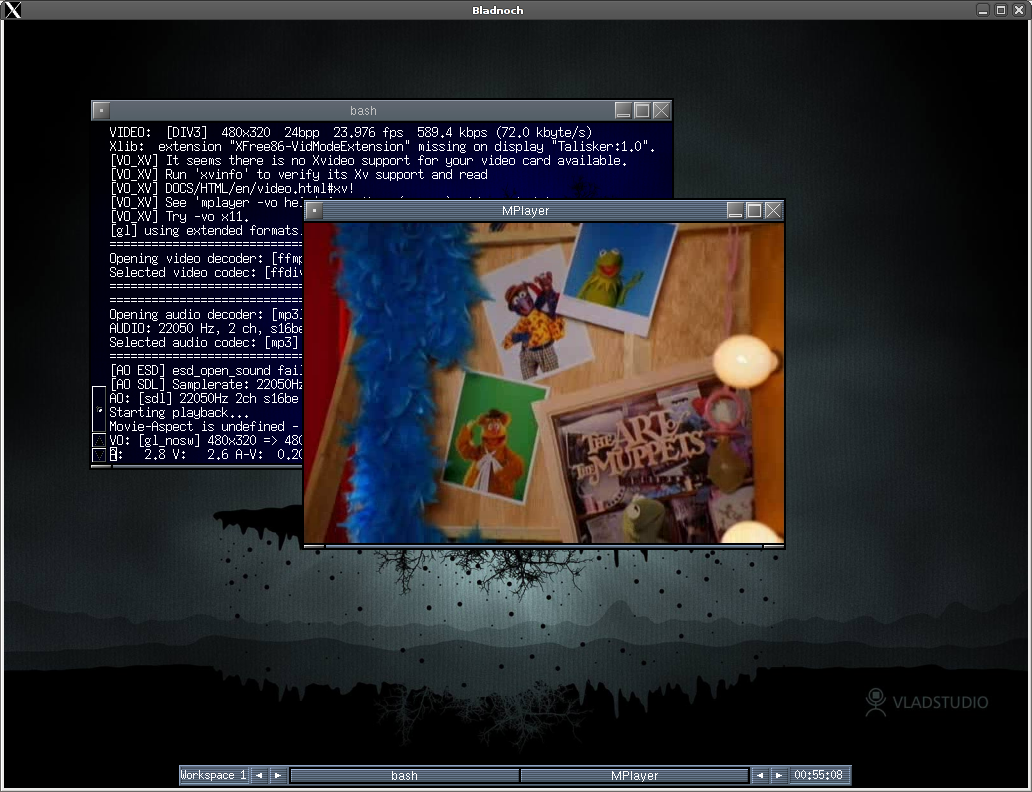Over the years, there have been a good number of decent RISC workstations: DEC, IBM, SGI, Sun and HP all had their time. Nowadays there's hardly any left - pretty much all of the large UNIX manufacturers' workstations have been discontinued. I still have mine though, and I like them too much to let go already.
Open source software offers a way to get decent, modern applications on an older machine: if you have the source, you can build it. But building every bit of software from source, tracking down dependencies, takes a lot of effort and time... or does it? Here's where pkgsrc comes into play. New quest unlocked: turn HPUX 11.11 in a desktop that is usable for day-to-day tasks.
The NetBSD Packages Collection (pkgsrc) is a framework for building third-party software on NetBSD and other UNIX-like systems, currently containing over 8000 packages. It is used to enable freely available software to be configured and built easily on supported platforms. Now, supported and easy are terms that will be filled in differently depending on whom you ask, but... why not give it a shot?
This is the machine I've been using:

It's a HP C8000 workstation, sporting two dual-core PA8900 "Shortfin" CPUs at 1.1GHz, 4GB RAM, four U320 SCSI disks and three gigabit ethernet ports. It is configured with HPUX 11.11, patched to the last goldpak release (12/2009). Graphics have been setup, and CDE is working on it (ahhh, CDE nostalgia...). Both OS and data disks are in a mirrored LVM setup, so both performance and safety should be okay.

First I downloaded and unpacked the gcc compiler, conveniently prebuilt for HPUX, which you can find here - many thanks to Tobias Nygren for making this possible! After unpacking gcc, one has to run the mkheaders script:
$ /usr/local/gcc4/libexec/gcc/hppa2.0w-hp-hpux11.11/4.2.3/install-tools/mkheaders
Add /usr/local/gcc4/bin to your $PATH, and make sure that your $CC is set to gcc. If your OS has the needed bundles to do development - HP C/aC++ Developer's Bundle comes to mind; if you're reading this article, you're probably familiar with getting HPUX in development-ready shape - you should be good to go. Next was downloading pkgsrc itself. I picked the most recent "stable" release at the time of writing, which was pkgsrc-2010Q4. Beware; untarring this can be problematic. Standard UNIX tar cannot handle the length of paths inside the tarball, so you may want to untar on a machine that has GNU tar (like Linux, BSD, ...). I created a dedicated LV of 8GB for this pkgsrc tree, mounted it on /mnt/alverware-2010q4, and created a symlink:
$ ln -s /mnt/alverware-2010q4 /alverware
This will allow me to easily switch between different (stable, development, ...) pkgsrc releases; all it takes is changing that symlink. The newly unpacked pkgsrc tree was put under /alverware/pkgsrc. I'll keep my own structure throughout this article; it speaks for itself that you can put it wherever you like.
Bootstrapping pkgsrc turned out to have a small glitch: the unit-tests for bmake don't like HPUX much (or don't like *my* HPUX much... can anyone confirm?). Quick and dirty solution is to edit the Makefile.in to exclude unit-tests altogether.
$ vi /alverware/pkgsrc/devel/bmake/files/Makefile.in
Comment out the last line (starting with "cd ${.CURDIR}/unit-tests"). Next, you can bootstrap pkgsrc for HPUX, using gcc as default compiler and with a 32bit ABI. Don't use a 64bit ABI; it'll work partially, but subtle errors will appear (python, for an example, will not function at all). You'll also notice the --unprivileged option: this allows pkgsrc to run the "bmake install" phase as nonroot user, which I prefer a lot over giving the root password every five minutes. All files will be built under /alverware/pkg.
$ cd /alverware/pkgsrc/bootstrap $ ./bootstrap --prefix /alverware/pkg --pkgdbdir /alverware/pkg/var/db/pkg --sysconfdir /alverware/pkg/etc --compiler gcc --abi 32 --unprivileged
After roughly 10 minutes (on my machine), the bootstrap will have completed succesfully, and you will be back at the prompt. Update the vulnerabilities database:
$ /alverware/pkg/sbin/pkg_admin -K /alverware/pkg/var/db/pkg fetch-pkg-vulnerabilities
You can now start to tweak your mk.conf - the master configuration file for pkgsrc - to take advantage of your hardware, and add a few extra options:
.ifdef BSD_PKG_MK # begin pkgsrc settings ABI= 32 PKGSRC_COMPILER= gcc USE_NATIVE_GCC= yes MAKE_JOBS= 8 CFLAGS+= -D__STDC_EXT__ -D_XOPEN_SOURCE_EXTENDED -D_INCLUDE_XOPEN_SOURCE_520 -D_INCLUDE_HPUX_SOURCE -D_INCLUDE__STDC__ -D_INCLUDE__STDC_A1_SOURCE -D_REENTRANT UNPRIVILEGED= yes PKG_DBDIR= /alverware/pkg/var/db/pkg LOCALBASE= /alverware/pkg VARBASE= /alverware/pkg/var PKG_TOOLS_BIN= /alverware/pkg/sbin PKGMANDIR= man PYTHON_VERSION_DEFAULT= 26 PYPACKAGE= python26 PASSIVE_FETCH= 0 TOOLS_PLATFORM.install?= /alverware/pkg/bin/install-sh TOOLS_PLATFORM.awk?= /alverware/pkg/bin/nawk TOOLS_PLATFORM.sed?= /alverware/pkg/bin/nbsed .endif # end pkgsrc settings
Notice the USE_NATIVE_GCC which prevents pkgsrc software from pulling in pkgsrc' own gcc as a dependency, and the biggest time saver of all: MAKE_JOBS. I have it set to 8 (as in make -j8); two jobs per cpu core seems to give decent results here. Next on the list is building GNU tar (didn't you wish you had that before?):
$ cd /alverware/pkgsrc/archivers/gtar $ bmake && bmake install && bmake clean && bmake clean-depends
This should take quite a while - it will pull in a gigantic heap of dependencies of all kinds. It should complete without problems, after which you can add the following line to mk.conf:
TOOLS_PLATFORM.tar?= /alverware/pkg/bin/gtar
Once this is done you can start building as you wish. I'll document my own building track here, including various problems encountered while building, and a fix if available. Do note that I am NOT a developer, and my fixes may be quicker and dirtier than you'd like. A proper developer might be able to figure out the actual root cause (if I couldn't), and create a proper patch for upstream (which I can't).
Following the fixes documented below, I'm now working happily from my HPUX desktop. The following packages are installed on my system (and new ones are being added daily):
$ ls /alverware/pkg/var/db/pkg aalib-1.4.0.5nb2 libart-2.3.21 mkfontdir-1.0.5 aterm-1.0.0nb8 libast-0.7nb3 mkfontscale-1.0.7 atk-1.32.0 libaudiofile-0.2.7 mng-1.0.10nb2 autoconf-2.68 libcfg+-0.6.2nb3 monafonts-ttf-2.90 automake-1.11.1nb1 libcroco-0.6.2 mplayer-1.0rc20100913nb2 autoswc-1.6 libdvdnav-4.1.3 mplayer-fonts-20030714nb1 babl-0.1.2 libdvdread-4.1.3 mplayer-share-1.0rc20100913 bash-4.1nb1 libdv-1.0.0 ms-ttf-20020306nb5 bdftopcf-1.0.2 libexif-0.6.20 p5-gettext-1.05nb5 bigreqsproto-1.1.0 libffi-3.0.9 p5-XML-Parser-2.40 bison-2.4.3 libfontenc-1.0.5 pango-1.28.3 bmake-20100808 libgcrypt-1.4.6 pax-20080110 bootstrap-mk-files-20090807nb2 libgetopt-1.4.4 pcre-8.11 bzip2-1.0.6 libgpg-error-1.10 perl-5.12.2nb1 cabextract-1.3 libICE-1.0.6 pidgin-2.7.3nb2 cairo-1.10.2 libiconv-1.13.1 pixman-0.18.4 compat_headers-0.2 libidn-1.19 pkgdb.byfile.db compositeproto-0.4.1 libmad-0.15.1bnb1 pkg-config-0.25nb1 db4-4.8.30 libogg-1.2.1nb1 pkg-vulnerabilities dejavu-ttf-2.32 libpaper-1.1.24 pkg_install-20101212 desktop-file-utils-0.15 libpurple-2.7.3nb2 pkg_install-info-4.5nb3 digest-20080510 librsvg-2.32.1nb1 png-1.4.5 encodings-1.0.3 libSM-1.1.1nb1 popt-1.16 esound-0.2.41 libtasn1-2.9 pornview-0.2.0pre1nb7 eterm-0.9.5nb3 libtheora-1.1.1nb1 printproto-1.0.4 expat-2.0.1nb2 libtool-base-2.2.6bnb4 psutils-1.17nb2 gawk-3.1.8 libungif-4.1.4nb1 py26-expat-0nb4 gdb-5.3nb5 libvorbis-1.3.2 py26-xcbgen-1.6nb1 gdk-pixbuf2-2.22.1 libwmf-0.2.8.4nb8 python26-2.6.6nb5 gegl-0.1.2nb3 libX11-1.3.5 randrproto-1.3.1 gettext-lib-0.14.6 libXau-1.0.6 readline-6.1 gettext-tools-0.14.6nb1 libXaw-1.0.7 renderproto-0.11 ghostscript-8.71nb6 libxcb-1.7 resourceproto-1.1.0 ghostscript-fonts-8.11nb3 libXcomposite-0.4.2 screen-4.0.3nb4 gimp-2.6.11nb2 libXcursor-1.1.10 scrnsaverproto-1.2.0 glib2-2.26.1nb1 libXdmcp-1.0.3 SDL-1.2.14nb1 glu-7.4.4nb2 libXext-1.1.1 shared-mime-info-0.90 gmake-3.82nb1 libXfixes-4.0.5 startup-notification-0.10 gmplayer-1.0rc20100913nb2 libXfont-1.4.2 tiff-3.9.4nb1 gnutls-2.10.4 libXft-2.1.14 tnftp-20070806 gperf-3.0.4 libXinerama-1.1 unzip-6.0 groff-1.20.1nb2 libXi-1.3.2 vera-ttf-1.10nb4 gtar-1.25 libxml2-2.7.8nb2 videoproto-2.3.1 gtar-base-1.25nb3 libXmu-1.0.5 vim-7.2.446 gtar-info-1.25 libXpm-3.5.8 vim-share-7.2.446 gtexinfo-4.13 libXp-1.0.0 watch-3.2.6nb1 gtk2+-2.22.1 libXrandr-1.3.0 xcb-proto-1.6 ilmbase-1.0.2nb1 libXrender-0.9.6 xcb-util-0.3.6 imake-1.0.3 libXres-1.0.4 xcmiscproto-1.2.0 imlib2-1.4.2nb5 libXScrnSaver-1.2.0 xextproto-7.1.2 inputproto-2.0 libxslt-1.1.26 xf86bigfontproto-1.2.0 install-sh-20100824 libXt-1.0.8 xf86dgaproto-2.1 intltool-0.40.6 libXvMC-1.0.6 xf86vidmodeproto-2.3 jasper-1.900.1nb5 libXv-1.0.5 xineramaproto-1.2 ja-sazanami-ttf-20040629nb1 libXxf86dga-1.1.1 xmlcatmgr-2.2nb1 jpeg-8b libXxf86vm-1.1.0 xorg-cf-files-1.0.3 kbproto-1.0.5 lzo-2.04 xproto-7.0.18 kochi-ttf-20030809nb5 m4-1.4.15 xtrans-1.2.5 lcms-1.19 makedepend-1.0.3 zlib-1.2.3 less-418 MesaLib-7.4.4nb3
You'll notice that there is NO FIREFOX there. First of all, building firefox is a very, very difficult task, and one I'm not capable of doing. Second, HP is offering a prebuilt depot of Firefox 3.5.9 for HPUX. Their version will undoubtedly be a magnitude faster and more stable than anything I could hack together, so... I don't touch it.
• x11/libX11:
The default options for libX11 have changed since the last pkgsrc release, causing all X11 applications to fail on HPUX' libc poll(). This can be fixed by doing the following edit:
Makefile:
Replace CONFIGURE_ARGS+= --with-xcb by CONFIGURE_ARGS+= --without-xcb
After this, I tend to build libX11, which pulls in a lot of X11 dependencies as well.
• devel/gtexinfo:
Dependency for graphics/netpbm → print/ghostscript → devel/ncurses. Ncurses are good; you want them. gtexinfo fails to build with the linker complaining about missing symbols BC, PC and ospeed. Edit the failing code:
$ vi work/*/info/terminal.cSearch for ospeed; you'll notice the three mentioned symbols are defined inside an #ifdef block. Move the definitions out - HPUX hasn't got those symbols, and the code fails to detect that, causing the ifdefs to skip the defines. After this hack, it builds and installs just fine.
• graphics/netpbm:
Dependency for print/ghostscript → devel/ncurses. Before you start the build, edit the top level Makefile, and comment out the following line:
USE_FEATURES= snprintfThis suffices for netpbm to build.
• print/ghostscript:
This piece of software has some ugly problems. First, start the build, and wait until it fails miserably. It's unclear to me why, but somehow the build system doesn't pick up the basic facts that
- HPUX does not use .so for its shared libraries, like Linux does, but .sl
- HP's own linker does not follow the same syntax as GNU ld, causing ugly files named "name=libgs.so" to be created in the totally wrong place.
To force-override these two vital details, change the following things in this specific file:
work/*/base/unix-dll.mak: GS_SOEXT=so needs to become GS_SOEXT=sl LDFLAGS_SO=-shared -Wl,-soname=$(GS_SONAME_MAJOR) needs to become LDFLAGS_SO=-shared -Wl,+h,$(GS_SONAME_MAJOR)Once you have done these two edits, it will complete succesfully.
• devel/ncurses:
If you have built the problematic dependencies mentioned above, ncurses should install without a problem. Make sure to clean everything afterwards.
$ bmake && bmake install && bmake clean && bmake clean-dependsOnce it's done, you can add another semi-crucial line to your mk.conf:
CURSES_DEFAULT= ncurses
• editors/vim:
The only real editor in the world! This doesn't require any fixes, except you need to accept the license in mk.conf by adding the following line:
ACCEPTABLE_LICENSES+= vim-licenseAt this point, I also included a big default options selection:
PKG_DEFAULT_OPTIONS= -hal -fam -daap -evolution -dbus -avahi -farsight -gstreamer -gnome -gtkspell -arts -pulseaudio -nas -x264 ncursesThis enables or disables all dependencies mentioned above for all applications to be built, supposing an application offers the option of enabling/disabling it.
• multimedia/libdvdnav:
Dependency for multimedia/mplayer. This will fail during configure due to an obscure pthreads detection bug which seems to have haunted OSX as well. Pthreads shouldn't be an issue, so we'll force configure to continue, regardless of what it says:
work/*/configure:
Search for the following code: return pthreads_create(); return 0;
Replace by: return 0;
Dirty? Yes. But it'll continue and finish building.
• devel/SDL:
Dependency for multimedia/mplayer. Start the build with bmake, and wait for it to fail, then edit:
work/*/include/SDL_stdinc.h: remove the "strings.h" includeRestart the build. Fixed.
• multimedia/mplayer:
Start the build with bmake, and wait for it to fail. Edit:
work/*/config.h: add the following lines:
#define lrintf(x) ((int)(rint(x))
#define __open64 open
#define SIZE_MAX ((size_t)-1)
#define atoll(x) strtoll(x, (char **)NULL, 10)
#define ldexpf(x, y) (float)ldexp(x, y)
work/*/libavutil/libm.h: comment out the following function entirely:
static av_always_inline av_const long int lrintf(float x)
After these edits, it'll build. And it works too:

MUPPET SHOW ON HPUX! I bet that's a world first, right here.
• wm/fluxbox:
Fluxbox acts a bit weird when being built in an unicode shell on UX. No idea why, but I had to start with:
$ LC_ALL=C bmakeEven then it fails on the polish translation, so I removed it, plus another quick hack to keep the UX linker happy:
nls/Makefile:
remove pl_PL from building (sorry, polish people)
src/Makefile:
change "LDADD = FbTk/libFbTk.a FbTk/LogicCommands.o defaults.$(OBJEXT)" to "LDADD = FbTk/libFbTk.a defaults.$(OBJEXT)"
After these edits, rerun bmake and it'll be fine. Now, you might wonder, how do you get HPUX' login manager to start fluxbox instead of CDE? The trick is setting xdmMode in the dt configfile, then restart it, and having a good .xsession:
$ grep xdmMode /etc/dt/config/Xconfig Dtlogin*xdmMode: True $ /sbin/init.d/dtlogin.rc reset $ cat .xsession exec /alverware/pkg/bin/startfluxbox $ chmod 700 .xsession... and next time you login, you get a nice fluxbox desktop. Supposing you don't want to sit behind your HPUX screen all day (building pkgsrc takes some time after all), you can test your X11 desktop using Xnest from a Linux or BSD machine:
$ Xnest -depth 24 -geometry 1024x768 -name Bladnoch -query Bladnoch :1This will get you the HPUX desktop via XDMCP in a window, like the screenshot above.
• graphics/ilmbase:
Dependency for graphics/gegl → graphics/gimp. .This contains some lowlevel math routines, some of which depend on math.h functions that aren't available on PARISC HPUX (they apparently are on IA64, but that doesn't help us, does it?). Edit:
work/*/Imath/ImathMath.h: Find the function defines and change them to match this:
static float modf (float x, float *y) {return (float)::modf ((double)x, (double*)y);}
static float ceil (float x) {return (float)::ceil (x);}
static float floor (float x) {return (float)::floor (x);}
static float hypot (float x, float y) {return (float)::hypot (x, y);}
• graphics/gimp:
Gimp builds fairly easy, although it'll take a while due to the whole of X11 libs and GTK2 being pulled in. The build will eventually fail in gimp itself with a linker error; symbol "finite" is unknown. Edit:
work/*/config.h: Add a new define:
#define finite(x) isfinite(x)
Restart the build, and it'll succeed.

• x11/aterm:
Aterm has a hardcoded utmp reference in pkgsrc, which we have to remove in order to be able to build:
Makefile:
remove the "--enable-utmp" reference
Just like with fluxbox, I had to start with:
$ LC_ALL=C bmakeAfter that you're all set.
• misc/watch:
Silly little tool, but I still like it. It'll fail when building, which you can fix easily:
work/*/watch.c: replace strtof(x) by (float)strtod(x)
• security/libgcrypt:
Dependency for security/gnutls → chat/libpurple. It has a very subtle problem which, if you don't fix it upfront, will cause anything gnutls related to fail. Start the build, but stop during the configure phase, then edit:
/work/*/random/rndunix.c: add #include <assert.h>
• chat/libpurple:
Dependency for chat/pidgin and chat/finch. You'll have to explicitly enable gnutls to get SSL support, and perl for non-C plugins:
PKG_OPTIONS.libpurple= gnutls perlIt builds cleanly except for one protocol:
protocols/gg/lib/libgadu.h:
find the code block that defines int8_t;
expand the "#if !defined(__CYGWIN__) && !defined(__SunOS)"
with "&& !defined(_INCLUDE_HPUX_SOURCE)"
Once this is done, you can continue building pidgin.

• chat/finch:
Something in pkgsrc and/or finch doesn't agree with wide character support. Getting finch to build on my machine demanded a very ugly hack:
Makefile:
set --with-ncurses-headers=/alverware/pkg/include/ncursesw
/alverware/pkg/include/ncursesw/ncurses.h:
add "typedef unsigned int wint_t;"
Looking through the ncursesw code, it looks as if something went wrong - large and vital parts of the code are between "if 0" blocks, effectively eliminating them.
• textproc/rarian:
This build will error out on a duplicate definition of strrstr. Remove the one provided by rarian itself:
work/*/librarian/rarian-man.c:
comment out entire function "static char *strrstr (char *s, char *wanted)".
• net/ORBit2:
This package uses IPv6 calls, but doesn't add the proper linker flag. Edit:
Makefile:
add LDFLAGS+= -lipv6
You do need the IPv6 bundle for this, naturally! You can get the bundle from HP for free at this page.
• sysutils/dbus:
Some things really do depend on dbus, so what the heck... just build it. Build will fail on missing symbol "vsyslog"; this is easily fixed:
work/*/dbus/dbus-sysdeps-util-unix.c:
replace all invocations of "vsyslog" by "syslog"
• multimedia/gstreamer-0.10:
I would have preferred not building this, but some things had hardcoded dependencies on it. Anyway, to get it to build, the following define is needed:
work/*/config.h:
add #define MSG_DONTWAIT 0
• textproc/gnome-doc-utils:
It's fairly ironic, but the thing in gnome-doc-utils that fails is... the docs. I guess we can live without the docs for gnome-doc-utils, can't we?
work/*/Makefile:
remove 'doc' from DIST_SUBDIRS and SUBDIRS variables
• sysutils/eggdbus:
This package feeds bad GNU linker options to HP's ld. Won't work, of course...
work/*/src/eggdbus:
remove "-Wl,--as-needed" from LDFLAGS
work/*/src/tests:
remove "-Wl,--as-needed" from LDFLAGS
• security/libgnome-keyring:
Not much to do here; one define for a differently named symbol:
work/*/config.h:
add #define MAP_ANON MAP_ANONYMOUS
• textproc/enchant:
Even though size_t and gsize seem to have the same type, automatic casting doesn't work too well. Therefor a specific cast:
work/*/src/myspell/myspell_checker.cpp:
164: size_t result = g_iconv(m_translate_in, &in, (gsize*)&len_in, &out, (gsize*)&len_out);
190: size_t result = g_iconv(m_translate_in, &in, (gsize*)&len_in, &out, (gsize*)&len_out);
206: if ((size_t)-1 == g_iconv(m_translate_out, &in, (gsize*)&len_in, &out, (gsize*)&len_out)) {
• editors/abiword:
To get abiword to build, quite a few fixes are needed. First of all, abiword defines a symbol which already exists in HPUX. We're not using this native symbol, so we undefine it first to allow it to be defined without error.
work/*/config.h:
add #undef m_unit
The 'main' makefile contains a few references to a linker option that is not valid for HP's ld, only GNU. Remove it:
work/*/src/Makefile:
remove all references to "--fno-undefined"
Another makefile has an issue with the plugins: we are not building any plugins, yet it wants to do a for-loop over them. Fails badly:
work/*/src/plugins/Makefile:
remove all "for plugins in ... done" blocks
Next, we get to apply the same size_t/gsize fix we had before:
work/*/src/af/util/xp/ut_iconv.cpp: line 314:
return g_iconv((GIConv)cd, (char **)inbuf, (gsize*)inbytesleft, outbuf, (gsize*)outbytesleft);
Finally, we have one file that uses strtof, which we haven't got:
work/abiword-2.8.6/src/wp/ap/gtk/ap_UnixDialog_Tab.cpp:
replace all instances of "strtof" by "(float)strtod"
EDIT: even though this builds, it doesn't actually run - it's lacking a symbol. Will look into it. For the time being it's not worth building this.
• net/libtorrent:
Libtorrent depends on a syscall mincore which indicates whether or not a specific page is in memory. This apparently strongly reduces page faults, boosting performance. HPUX hasn't got it, so we'll have to build without it.
Makefile:
add --disable-mincore to CONFIGURE_ARGS
Next, we run into another example of an application redefining a system macro:
work/*/rak/priority_queue_default.h:
add #undef m_slot
• net/rtorrent:
Some symbols are only defined if the proper compiler flag (_REENTRANT) is given on HPUX. At this point, I've added it to PKG_DEFAULT_OPTIONS (see above). Next, two symbols are missing on HPUX, and m_slot needs to be undefined again:
work/*/config.h:
#define AF_LOCAL AF_UNIX
#define PF_LOCAL PF_UNIX
/work/*/rak/priority_queue_default.h, /work/*/src/option_parser.cc, /work/*/src/display/text_element_string.h:
#undef m_slot
